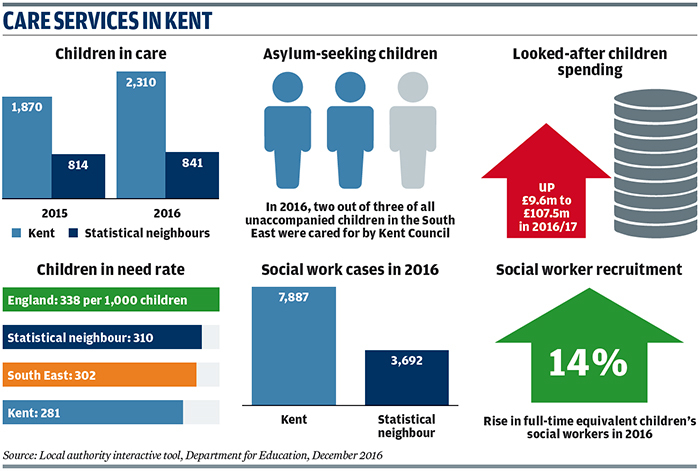Local Spotlight: Kent County Council
Derren Hayes
Thursday, June 29, 2017
How Kent has managed to improve social care services while coping with an unprecedented influx of asylum-seeking children.

Ofsted's "good" rating of Kent children's services is an important marker in the authority's recovery from its 2010 "inadequate" judgment. It also built on progress from the "adequate" ratings handed to safeguarding and looked-after children services in 2012 and 2013 respectively.
The good rating was delivered despite what Kent chief executive Paul Carter calls "significant headwinds", the greatest of which was the influx of unaccompanied asylum seeking children coming into care in 2015. However, the general rise in the looked-after children population has added pressure.
Kent is one of the largest English authorities and the council works with up to 10,000 children at any one time. It is also an area that has a growing children's population and is likely to rise further due to large numbers of new housing developments under construction.

FOCUSING ON EARLY HELP AND PEER CHALLENGE HELPS KENT IMPROVE SERVICES
In the second half of 2015, during the peak of the Syrian refugee crisis, Kent Council was caring for about 1,500 unaccompanied asylum-seeking children (UASC) who were smuggling themselves into the country in lorries and ships. Since then, the number of UASCs arriving has slowed, and the introduction of the national dispersal system sees new arrivals placed with other councils. The number of UASCs in the care of Kent is now 500, but the challenges have changed, rather than disappear, explains Philip Segurola.
"The majority of the arrivals were 16- and 17-year-olds; they are now turning 18 and we have care leaver responsibilities," he says. "We have 900 care leavers who were former UASC."
Despite these "unprecedented events", the council's recent Ofsted inspection report praises the quality of services that young people - unaccompanied children and those born in Kent - receive. Andrew Ireland, the council's director of children's services, says it was a testament to social care staff that services didn't deteriorate considering the pressures it was under.
"We worked extraordinarily hard to minimise the impact," he says. "We were determined the whole service didn't go under as a consequence."
Ofsted praised the quality of Kent's early help services, and Segurola says this, and keeping caseloads manageable, has been crucial in managing demand.
"Keeping pace with demand is constant," he adds. "There is a clear correlation between management group, manageable caseloads and quality of practice. Across our 12 districts, the ones that performed strongest have that."
In addition to the demands from UASC, the council has seen a rise in the number of local authorities moving vulnerable children and families to Kent because property is relatively cheap. "One particular London authority bought old army barracks in Canterbury and placed 200 homeless families - that's a social work caseload," Segurola says.
He adds that 1,300 children in out-of-authority care placements also live in Kent, and the council has appointed a coordinator to "engage with authorities to ensure they follow guidance". "The authority should consult with us before placing the child, but it is rare that happens," he says. "It is not in the young person's interest to be placed without proper planning, particularly around education."
Another key to the council's improvement has been an appetite to test itself through the peer review process. Segurola says the authority had become "a little insular and complacent", and to address that it has "taken account of work in good authorities". The "outstanding"-rated Tri-borough authority in West London recently carried out a review of its fostering services, producing "strong conclusions on aspects that were good and those that needed development".
He adds: "It was valuable, and to improve, you want to benchmark yourself against the best."




